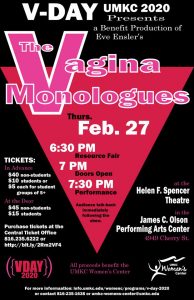As you may have heard, this year, like many years past, the UMKC Women’s Center is putting on a production of The Vagina Monologues on February 27th. When I was first hired at the Women’s Center last October I was told this was an event we would be putting on, and it piqued my curiosity. I had heard of the monologues but beyond the name I didn’t know much about them, as I had never attended or heard of a school where they were put on local performances. As someone with a vagina who does not identify as a woman, it initially bothered me that the monologues were still a thing, as it seemed like it was using “vagina” interchangeably with “woman”. As we now know in 2020, not everyone with a vagina is a woman, nor do you have to have a vagina to be a woman. Before I made any sort of judgement about the monologues though, I decided I should do some digging and find out just what they were all about.
After reading up a bit about it on the Wikipedia page, I learned a bit more about the history of the monologues. Originally, it was written about cis women and their bodies. But in 2004, playwright Even Ensler added a monologue about being a trans woman. In a 2015 Time article, Ensler wrote that “The Vagina Monologues never intended to be a play about what it means to be a woman. It is and always has been a play about what it means to have a vagina. In the play, I never defined a woman as a person with a vagina.”
Yes, some of the monologues are written from the perspective of girls or women explicitly, but not all of them are. Some can be interpreted just as experiences of other vagina-owners. UMKC currently opens our performance to be performed by all women and nonbinary people who would like to be involved. The Vagina Monologues is ever-evolving, with Ensler adding new ones and tweaking the script each year. Perhaps in the future she could write from the perspective of a trans man’s vagina, or a non-binary person’s vagina. Or she could consult some trans women who have elected for bottom surgery about their experiences with their vaginas. Or even non-bottom op trans women about their experiences with what vagina means to them. I feel there’s a lot of different topics she could explore while striving to make the play more inclusive. There are thousands of stories out there about vaginas, how the shape of one’s genitals dictates their treatment in society and the roles they are allowed to play. All of those stories deserve to be told. As long as Ensler keeps working on telling those stories and doesn’t intentionally leave any out, I think she’s doing good work.
I do not think The Vagina Monologues are free of criticism, but I do think they try their best to be inclusive. It’s a fluid project, and the script seems to be a living document, changing from year to year. It is definitely a project I am excited to support, and I look forward to seeing the performance for the first time this February. You should come check it out too!
